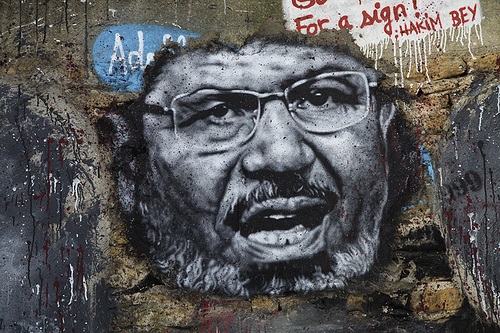Morsi in Prison
by Hamdy El-Gazzar and translated by Amani Elmawed / November 18, 2013 / 1 Comment
“Morsi could have been accepted as an Imam in a small village, but not as the president of Egypt.”

Although imprisoned, Mohamed Morsi's face still remains within the minds of Egyptians. Photo by Thierry Ermann via Flickr
On Monday, November 4 , Egypt’s ousted president Mohamed Morsi appeared in court along with other senior leaders of the Muslim Brotherhood. They were tried on charges of inciting the murder of peaceful demonstrators in front of the Federal palace, which had been Morsi’s home at the time. Morsi will also face charges in several other cases, including collaborating with Hamas, the Palestinian wing the Muslim Brotherhood, on the January 2011 jailbreak that set Morsi and 33 high-level Brotherhood members free .

- “From Egypt” attempts to draw a cultural map of Egypt and the Arab world by profiling the artistic, literary, and political issues that affect the region via on-the-ground coverage of current events, publications, and the fight for freedom of expression.

- Hamdy El-Gazzar is an Egyptian writer and one of the 39 young Arab writers included in the Beirut 39 Project. His first novel, Sihr Aswad (Dar Merit, 2005) won the prestigious Sawaris Award, and was subsequently translated by Humphrey Davies (Black Magic, AUC Press, 2007). His second novel, Ladhdhat Sirriyya (Secret Pleasures) was published by Dar al-Dar in 2008. He is currently working on a third novel.
It all might as well be from an old Greek tragedy: The hero is a character subject to ridicule, criticism, and jokes of the like that have never been bestowed upon a president in the whole of Egypt’s history!
Mohamed Morsi, who served as president for a year, was not capable of leading a country like Egypt—especially after a revolution that effectively toppled a dictator who had ruled for 30 years. Morsi is from a modest, provincial town in the Sharqia Governorate and his rustic behavior was evident even after he was elected. Egyptians still joke about his insatiable glances at the female Prime Minister of Australia! Moreover, Morsi is the first Egyptian president to wear a beard—even if it was short, according to the Salafists, who have longer ones—and the first president who made Friday prayers a political event, showing his piety and devout nature every week. He was also the first to improvise long speeches, in which he spoke nonsense and said nothing important!
Morsi could have been accepted as an Imam in a modest mosque in a small village, but not as the president of Egypt.
Politically, Morsi has never been the top man in the Muslim Brotherhood. As a presidential candidate he lead the Freedom and Justice Party —the apparent political wing of the Brotherhood—but in reality he was a backup candidate who did nothing. Besides, Khairat el-Shater , the “Iron man” of strong regulations , was really the first candidate chosen by the Brotherhood, who are professionals in their secret work and methodical lies.
Before the revolution, Morsi served as a liaison between the Brotherhood and Mubarak’s state security. Blindly loyal to the former, and fully obedient to its leaders, Morsi was a man of Brotherhood fulfillment, empty of all thoughts and personal creativity.
When he came to power, after giving his oath three times to respect the Constitution, the law in Tahrir Square, and the Supreme court at the University of Cairo , Morsi issued the strangest constitutional announcement you could ever imagine. It was an announcement that made him an ultimate dictator above the Constitution and the law . That was his mistake. In the secret hierarchical order of the Brotherhood Morsi ranks seventh or eighth. As such, he only had the ability to do what he was told to do by the group’s Guidance Bureau, including the constitutional declaration that sparked outrage in the country.
For many reasons, it was necessary for the Muslim Brotherhood to come to authority; not only because they’ve yearned for it for the last eighty years and have used every means available to reach it, or because they are an international organization seeking the establishment of an Islamic Caliphate as an alternative to the modern state, but also, most importantly, because they wanted to make Egyptians know them and try their ways.
Egyptians knew very little about the Men of God (as they are believed to be) until they sat on the throne. Then, over the course of their long year in power, Egyptians came to know them as Adam knew Eve. They learned who they were, what they wanted in this country, and the nature of their plans and ideas. It was necessary for Egyptians to try a theocracy that ruled under the name of God with men like angels, who were experts in leading subjects, not citizens.
But with this power structure, in one way or another, Egypt was on its way to becoming another “Iran.” Egyptians realized this during Mohamed Morsi’s reign, so they refused him and rebelled once more. His trial is set to continue on January 8.





One Comment on "Morsi in Prison"
Hamdy El-Gazzar beter if you focus on fiction. You have used words to insult a great man like Mohammad Mursi. You must write somethng which can help the people in their quest for democracy, and after all it was not Mohammad Mursi a wrong and unexperienced person for never born democracy in Egypt but it is you thousands of people become addicted of iron rod.